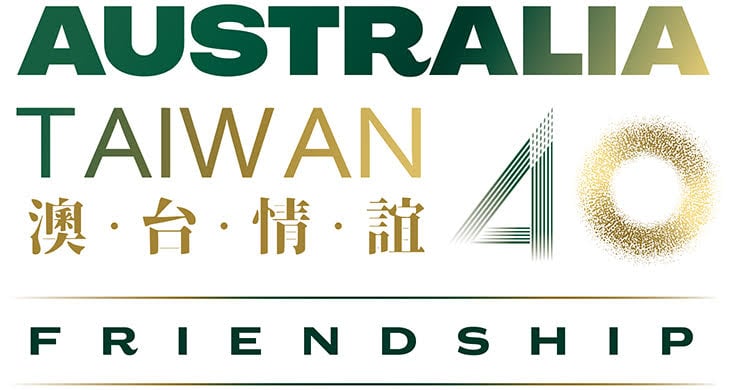
This week, ‘40 years, 40 stories’ brings you Celalaq Kavulungan (Shih Hsiung-wei), chief of Paiwan Family Trust and a self-made entrepreneur who strives to create business opportunities while seeking ways to give back to his tribal roots. Celalaq tells us how he has built his business network and the connection he feels with Australian Aboriginal cultures.
My name is Shih Hsiung-wei, and my Paiwan name is Celalaq, which means lightning, thunder and calling. My memory always brings me back to the days when I was growing up surrounded by the sun, wind, rain and land of the tribe – and by the voices of the elders. There is a special feeling that comes from our respect and awe for nature, and from understanding the relationship between humans and nature. The nourishment and growth nurtured in the mountains, forests and green fields has also cultivated my character of continuous pursuit and exploration.
In 1991, at 28 years old, I bid farewell to my family in the tribe and flew across the South Pacific to Fiji with my wife and children, leaving everything else behind and starting anew. I named our company after my wife Liana. We specialised in hairdressing products and the salon business, opened a hairdressing school, and helped under-privileged young people acquire skills and start their own businesses. In the process we expanded the family business to several other island countries in the South Pacific.
In 1994, I visited Australia for the first time with my family. The beautiful living environment, high quality of education and the ‘Dreamtime’ world view of the local Aboriginal peoples, which had many similarities with our ancient Paiwan cosmology of animistic beliefs, ignited our family's long-term plan to emigrate to Australia.
Starting from 2002, my children began to pursue their studies in Australia one after another. That year also marked the beginning of our family's investment and entrepreneurship in Australia.
After immigrating to Australia, I found myself captivated by Australian Aboriginal cultures. Australian Aboriginal elders rely on oral storytelling to connect the past and the present. The artists express their culture and myths in paintings of nature, connecting with the spiritual power of all things in the universe. The transmission of our Paiwan culture is reflected in the totems of clothing, tattoos and tattooed hands, which connect us with our ancestral spirits. The elders of the Paiwan ethnic group also attach great importance to storytelling to pass on our culture, myths and stories. By repeating the same names and the names of the ‘family house’, the family house name and the ancestors’ names will not be forgotten from generation to generation.
Australian Aboriginal cultures use colourful animals to symbolically express the concepts of life and death. Most prominent among these is the Rainbow Serpent, which created the world and the land and peoples of Australia during the Dreaming. As for the Paiwan, our noblest tribe-members are regarded as descendants of the sun, and the hundred-pacer snake is the patron saint of the Paiwan people. In the myths and legends of the Paiwan people, the hundred-pacer is thce king of snakes, and when it gets old it turns into an eagle, the king of the sky. The hundred-pacer has the symbolic meaning of the leader and is the exclusive pattern of the nobles of our tribe.
Bonfires are also something the Indigenous peoples of Taiwan and Australia have in common. Trees are burned for the scent of their smoke. Different burning woods produce their own unique scented smoke and thus carry different meanings. They form the medium of communication to the ancestral spirits and among all beings.
We chose Fiji initially because its languages, pronunciations, and cultures are similar to those of the Paiwan people, which gave me a lot of confidence. I also believed being in a country with similar cultures would help my career development. The road from starting an overseas business to bringing it back home begins with small attempts, which gradually turn it into a company (‘point’), then to subsidiaries, then extend into crossover collaborations (‘many lines’), finally forming a full-scale business development network (‘surface’).
In 2002, my investment expanded into Australia, and part of the profits earned were invested back into the tribe, starting from the purchase of ancestral sacred land, and slowly buying back the lost lands of the tribe. Connecting the family business from Fiji, Australia and Taiwan into one big network has given me a blueprint for realising my ideals. In the past 30 years, I have been running back and forth between Taiwan, Australia, and Fiji, seizing different opportunities to succeed. Growing up impoverished inspired me to travel across the ocean in pursuit of success, and the challenges encountered on the way laid the foundation of our family business. Now I am focusing my energy on the tribe that gave birth to me, devoting resources to restore the cultural spirit of my hometown and to revitalise the tribal economy.
As we face the post-pandemic era, I look forward to exchanges between Taiwanese and Australian Indigenous peoples, starting from sharing ways to pass down and revive our cultures, and then gradually extending to cooperation in agroecology and education. I believe that as long as we protect the land that nurtures life and make good use of natural resources, time will show us how the exchange of culture, education and agroecology between Australian and Taiwanese Indigenous peoples can open up new opportunities in sustainable environment and economy.


